Viewpoint: Expect evil, offer forgiveness
- Published
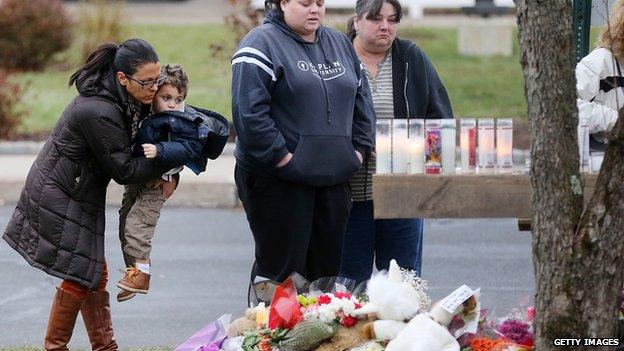
As long as we have free will, columnist Rod Dreher says, we'll have evil acts like the school shooting in Newtown, Connecticut. But we'll also have the ability to love, forgive and overcome.
Newtown, Connecticut, is the kind of place people of means move to when they want to escape the crime, the chaos and the violence of the big city. Now, this tranquil suburban community will forever be known as the town where a madman massacred a classroom full of kindergartners two weeks before Christmas.
The incongruence is instructive. It tells us something about the nature of evil, and our own vulnerability to its malign workings.
I live in a place like Newtown, a village whose population has grown over the last decade as upper middle class people leave the nearby city in search of safer streets and better schools. The wealthiest of these newcomers settled in The Bluffs, an exclusive housing development that features a country club and an Arnold Palmer-designed golf course.
Two summers ago, an eight-year-old boy cycling with his family down a nature trail there was set upon by a teenager. The older boy, 16-year-old Trevor Reese, allegedly jumped out of the woods and began stabbing the child with a knife. He finished the little one off by slitting this throat.
Reese lived in The Bluffs, made good grades, and had no history of mental illness prior to the attack. Charged with first-degree murder, Reese pled not guilty by reason of insanity, and awaits trial in early 2013.
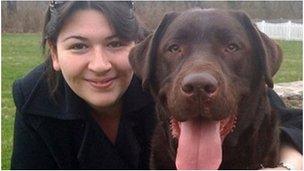
Rachel Davino
When the trial begins, the community will learn more about life in the Reese home - including, perhaps, clues as to why the Reese boy committed this ghastly crime. If we can figure out why he did it, might we prevent this sort of thing from happening in the future?
Maybe. But I doubt it.
We need to believe that acts like Lanza's, and Reese's, resulted from a predictable chain of causation, because that props up the illusion that we can make ourselves safe from chaotic evil. The urgent gestures in the American public square in Newtown's wake bring to mind Auden's lines upon the outbreak of the Second World War:
All the conventions conspire
To make this fort assume
The furniture of home;
Lest we should see where we are,
Lost in a haunted wood,
Children afraid of the night
Who have never been happy or good.
To be sure, there are many things communities and individuals can and should do to reduce crime and violence. But as in the case of Newtown killer Adam Lanza, a quiet young man who drew the notice of no-one, there will always be a lone gunman, lurking in the shadows. It's in our nature.
As long as we have freedom - that is, as long as we remain human - we will have evil in our midst. Though we will never have the ability to protect ourselves from radical evil in every instance, we retain the power to refuse it the final word.
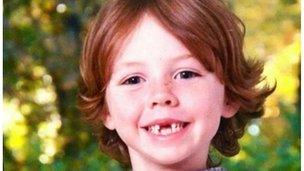
Daniel Barden
It is difficult to imagine a more peaceable place on this earth than a one-room Amish schoolhouse in the rolling green hills of Lancaster County, Pennsylvania. In 2006, a man deranged by rage at God over the death of his infant daughter entered just such a place and murdered 10 Amish children before taking his own life.
What did the Amish, a pacifist Anabaptist sect, do in response? They comforted the grief-stricken family of the man who murdered their children.
"I just feel bad for the gunman," one Amish father told a journalist. "He had a mother and a wife and a soul and now he's standing before a just God."
An outsider tormented by hate murdered their children en masse - and the Amish responded with love and forgiveness.
Their act of love contradicts beyond all understanding our sense of justice, order and rationality. They met this grotesque negation of life with an even more stunning affirmation of life.
Does this mean that in the wake of such massacres, the state ought not pass stricter gun laws, or provide more mental health services, and suchlike? No, not necessarily. But there is in the response of these quiet country people a moral realism that the rest of us struggle to find.
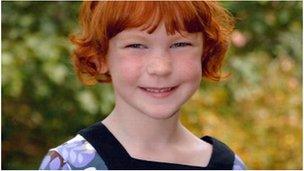
Catherine Hubbard
I think too of my late sister, Ruthie, stricken by lung cancer at 41. The odds that a woman her age who had never smoked would contract lung cancer are minuscule. She never saw it coming. Yet she did not pity herself, or trouble herself seeking causes for her catastrophe.
As Ruthie figured it, to lose herself thinking about the cosmic injustice of it all would distract her from living what time she had left with joy and delight.
Despite her pain and weakness, and the outrage that her husband would be left a widower and their three daughters motherless, Ruthie, a faithful Methodist, met her impending death with faith, hope, and, yes, love.
She surrendered to her powerlessness in the face of mortality, and as her life leaked away with each passing day, found the strength to live out some other lines from Auden: Life remains a blessing/Although you cannot bless.
Death took Ruthie's life, as it will take everyone's, but in a more important sense, death won no victory.
Some might call people like Ruthie and the Amish holy fools. If so, theirs is a foolishness that saves and redeems, a beacon of light and a thrill of hope in this haunted wood in which we live.
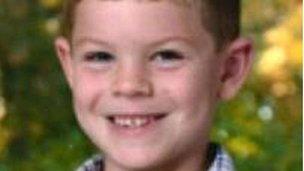
Jack Pinto
For them, the peace of their own hearts, and the peace of the whole world, depends on a child born in a cave to obscure parents living in a backwater Roman imperial province. That child would face his mortality in fear and trembling, sweating blood in the garden, and praying only for the strength to accept whatever was to come as the will of God. He died gruesomely on a cross, murdered by the state, and in his dying breaths would pray, "Forgive them, Father, for they know not what they do."
This is a kind of madness. But in a world gone mad with violence and bloodletting and the mass murder of little children, it just might be the sanest response of all - the kind of gesture that allows us not merely to survive, but to live.
Rod Dreher is a senior editor at The American Conservative. His memoir of his sister, The Little Way of Ruthie Leming, will be published in 2013. E-mail: rod.dreher@gmail.com